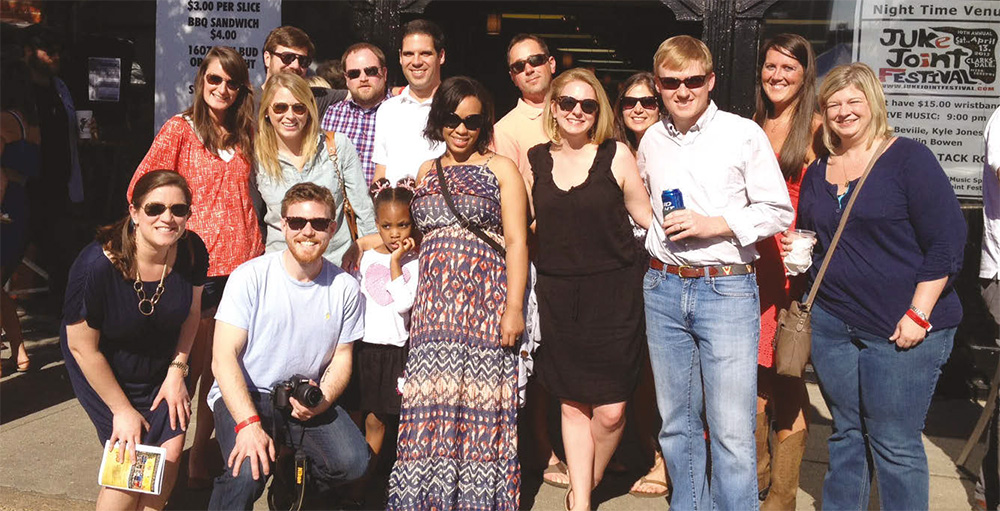By MARY LEE MCKEE
Many of the Teach for America corps members who came to the Delta thought they would stay for only two years. Instead, they fell in love with the region, found their soulmates and planted roots.
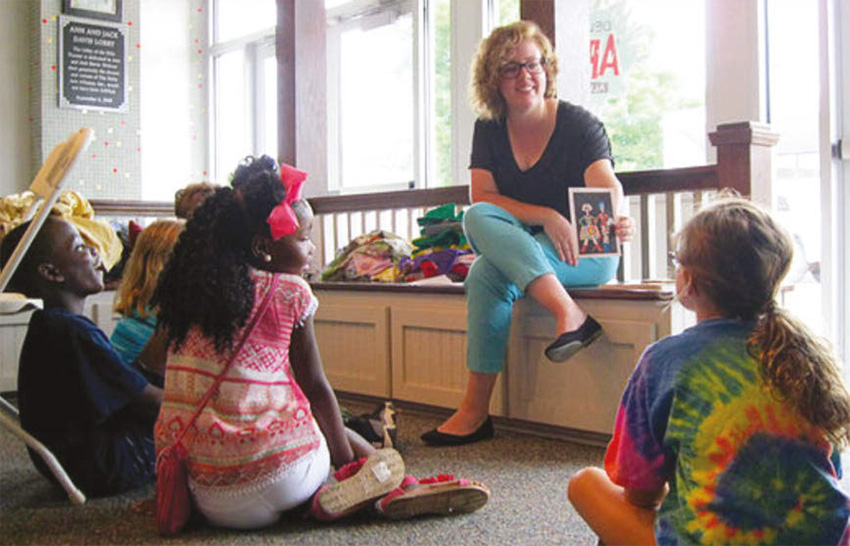
It’s a beautiful spring day and you’re at a festival, let’s say Juke Joint Festival in Clarksdale, and you’re in line for those delicious tamales everyone’s been buzzing about. You’re visiting from out of town, and it’s been years since you were there. In front of you is a couple with a toddler and a baby in a stroller. Unable to help yourself, because, well, you are from Mississippi, you strike up conversation. “How’re y’all doin’? Where’re you from?” Equally friendly, the woman replies, “We’re from Cleveland.” You detect she doesn’t sound like she’s from Cleveland. But not wanting to make assumptions, you ask, “Did you grow up there?” They laugh. “No, no. I’m from New Jersey,” she says, and he, “I grew up in Kansas.” “Wow. What brought you to the Delta?” They explain that they came with Teach for America (TFA) to teach for two years, he in a school in Leland and she in Indianola. That was over ten years ago.
This scenario repeats itself until, by the end of the day, you’re pretty sure you’ve met people from at least half of the United States. Over the years, you’ve heard more about people leaving the Delta than you’ve heard about people moving there. Yet during a matter of hours, you’ve met a small army of relatively new residents. You come to learn that so many of these transplants ended up here because of TFA, many with the intention of moving on after their two years of service. However, many of them did not move on but, rather, built a life here. They stayed.
This is a story about falling in love. Sometimes with each other. Sometimes with someone else. But always with a place. This place. The Delta.
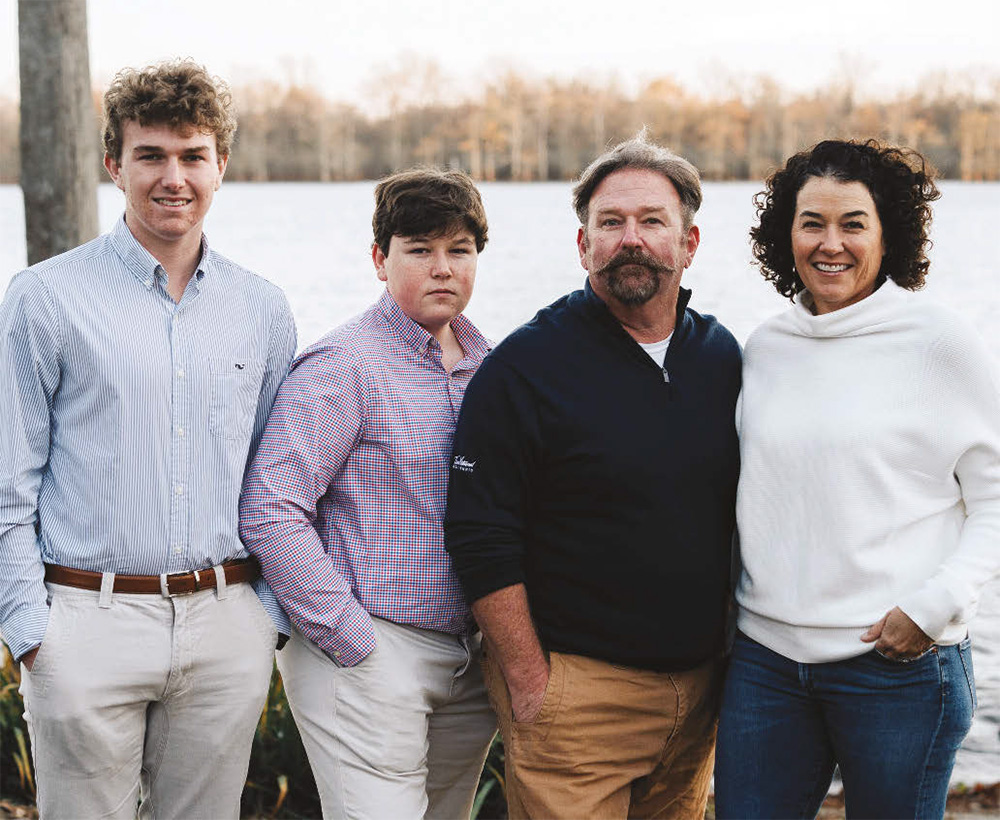
“There’s just something about it. It gets a hold of you,” Jenn Mohead of Lula declares, reminiscing on her own TFA journey from Florida to the Delta twenty-five years ago. “I couldn’t leave Walmart without seeing my students and their families. There was such a strong sense of community.” She taught in Helena and lived in Moon Lake, where she met her husband, local restaurateur and musician, John Mohead. She has lived in the Delta and worked with TFA ever since.
“This place ruins you,” according to Justin Zamm who lives in Lyon with his wife, Colleen, their six-year-old twins, John and Prudence, and their dog, Lula. “It slows you down—lets you have a conversation with somebody or have a cup of coffee or hear a song. Things you ordinarily rush through. It ruins you for the high-speed life.” Justin, who grew up forty-five minutes from New York City in Norwalk, Connecticut, and Colleen, who hails from Orange County, California, met as corps members in TFA in 2010. Together they have more degrees than a hot day in August. Justin is a classically trained guitarist with two degrees from Eastman Conservatory in upstate New York. Colleen studied at Columbia University, the University of Virginia, and Harvard Law School. She worked three years in corporate law with her sights set on going into public interest work. And then the recession hit; public interest jobs weren’t exactly plentiful. For so many, the recession changed people’s plans, including Justin’s and Colleen’s. However, an organization that appealed to Justin’s interest in teaching music and Colleen’s desire to serve the public interest was hiring. They applied to TFA and became teachers in Clarksdale and Ruleville.
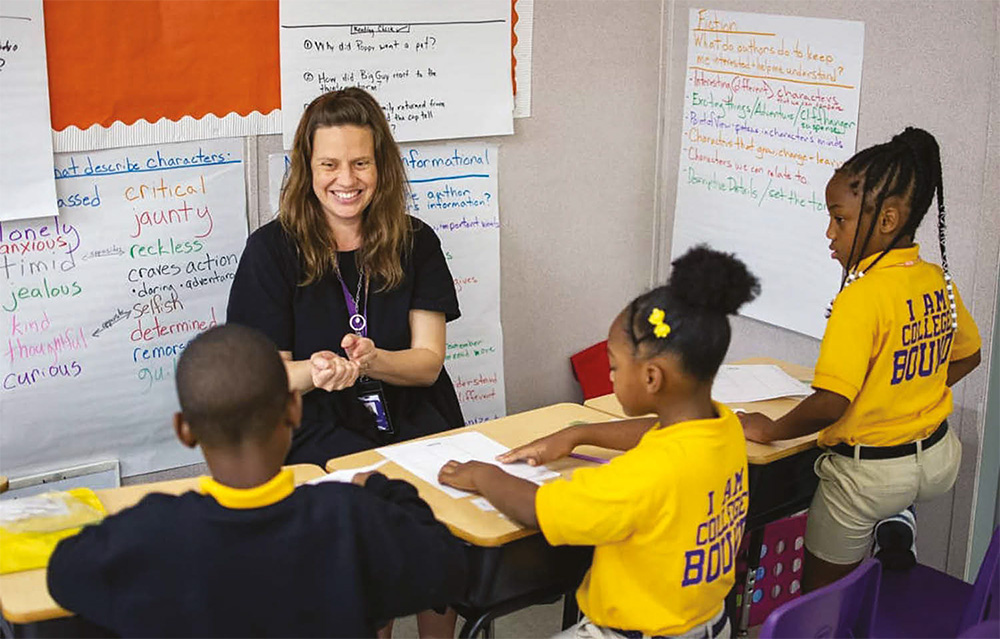
TFA launched in 1990 as a solution to meet the need for teachers in urban and rural schools by recruiting and training individuals, corps members, who commit to teaching for two years. Since 1991, over three thousand corps members from all over the United States have taught throughout the Delta, providing critical teaching support to schools and helping students achieve academic success. For many corps members, that two-year commitment turned into three years or eight years or twenty-five.
“I knew I wanted to stay longer than two years,” recalls Laura Howell, who is from North Carolina and is now the executive director of the Bologna Performing Arts Center at Delta State University. “I loved the Delta. It took getting used to the things I didn’t have, but I loved the sense of community and the unique way generations come together.” Laura did her two years of service at Carver Elementary in Indianola teaching fourth grade and lived in Leland, where she met her Delta husband, Frank Howell, at church. They live there now with their two children.
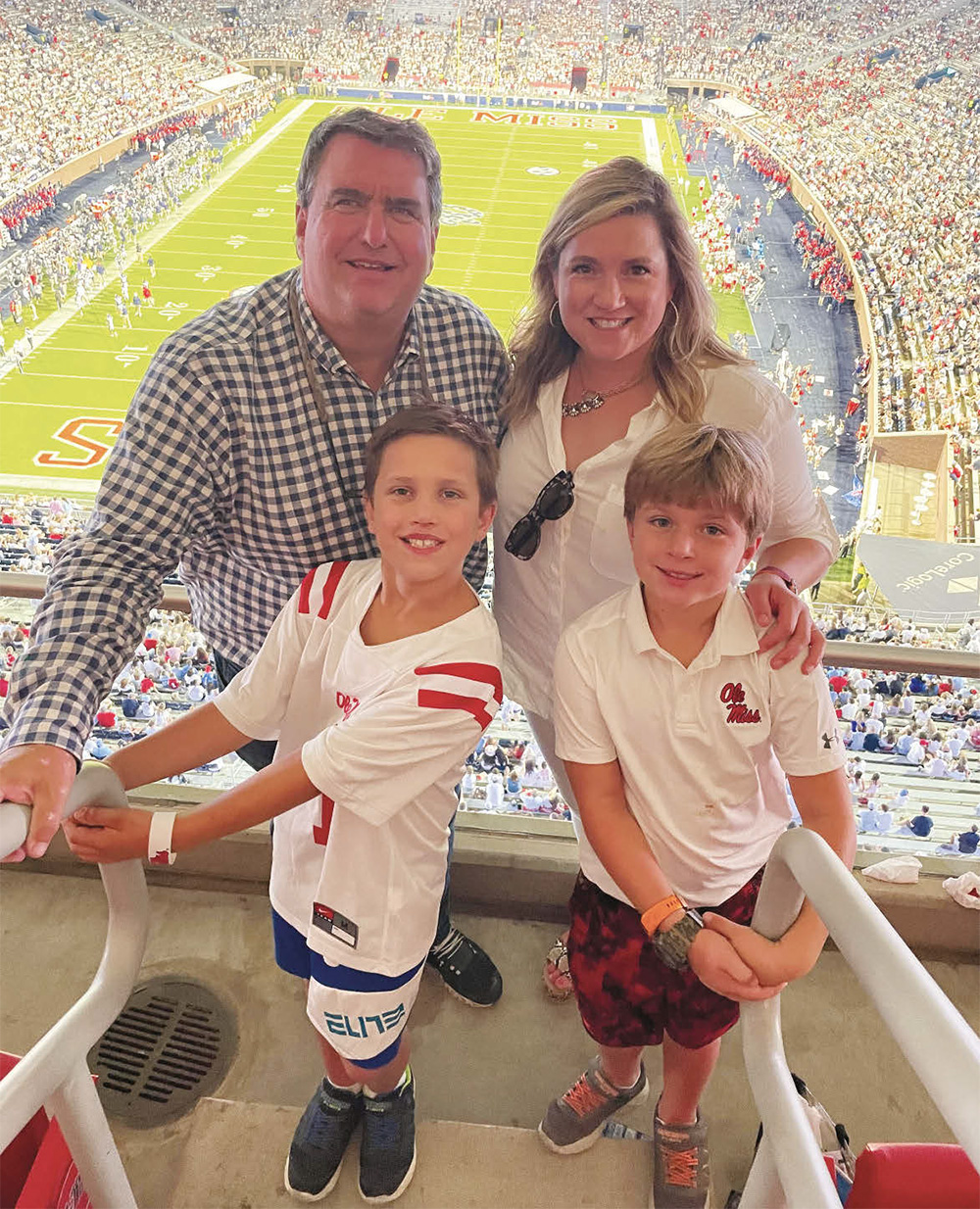
“Actually, I didn’t expect to stay longer than two years. I like to move around and try new things. If Todd and I had not started dating, I wouldn’t have stayed,” explains Shannon McMulkin, originally from Colorado. She and her husband, Todd Dixon, met at KIPP Delta Collegiate High School in Helena. Todd came with TFA in 2006 and taught at KIPP Delta for twelve years where he also established the physics program and eventually became a school leader. Shannon arrived in 2013 and taught for four years. They married in 2020 and are expecting their first child in February. “We have a great life here,” Todd shares, “and so many relationships.” They left teaching and launched their new business a year ago, SunCrop Solar and Energy Solutions, which largely focuses on residential energy efficiency. Already, they have saved their customers tens of thousands of dollars in utility bills. Shannon adds, “It’s very satisfying to go to the homes of people you know.”

Like Shannon, Amanda Johnson wouldn’t have bet on staying after completing her two-year commitment. “I didn’t think I would like small-town life. I definitely did not see being here long-term.” That was in 2003, and Amanda planned to practice law. “But I fell in love with the Delta, and after my first year, I knew I wanted to stay.” She continues, “I loved the people and being in community—the kids, their families, my co-workers. I loved the civil rights history, the culture of music and art. To be a part of that, to know families that are connected to that history is really meaningful.” Then she started dating fellow corps member, Sanford Johnson.
“During my second year, I asked Amanda to dinner one night…and the rest is history,” Sanford confesses with a hearty, happy laugh. For Sanford, currently the Mississippi executive director of Teach Plus, ending up in the Delta was the last thing he would have expected. “I was running away from Mississippi.” At Auburn University, he studied politics and policy with plans to go to law school and work in D.C. And then a funny thing happened while in school in Alabama that altered those plans. As any Mississippian knows, if you’re in Alabama, you will be subjected to relentless jokes about the Magnolia State. Sanford became defensive of his home state; he even developed a new affection for Mississippi and grew proud of it. Proud enough to want to work there. In 2002, he applied for TFA because he knew that experience would fuel the policy work he wanted to do. He was placed at Coahoma High School, and by the end of his first year, he knew he wanted to stay. He and Amanda married in 2006.
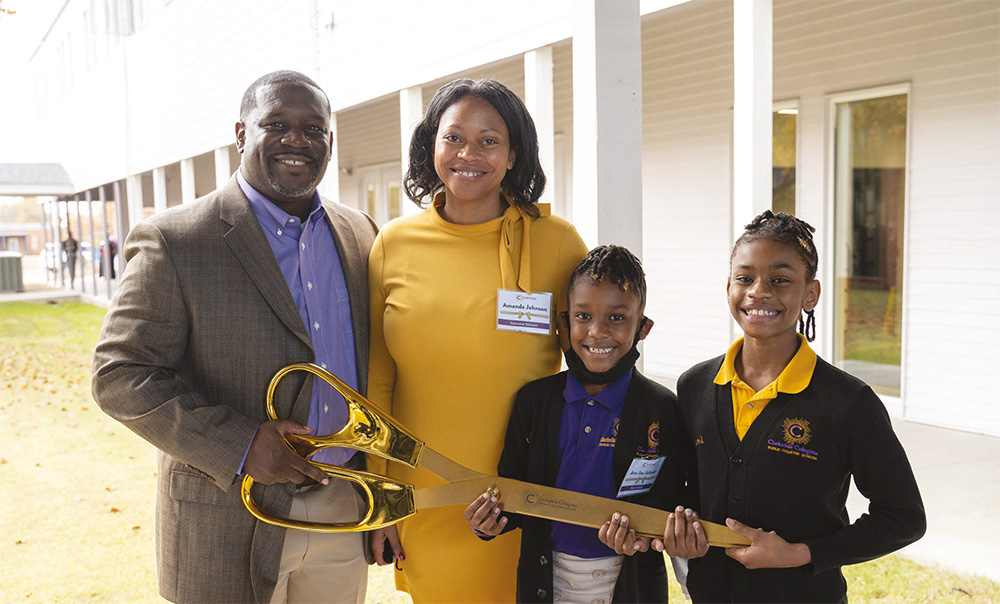
After helping to open the high-performing KIPP Delta Literacy Academy in Helena in 2009, Amanda founded Clarksdale Collegiate Public Charter School in 2018. The pre-work to open Collegiate provided an opportunity for some of Sanford’s earliest policy wins. “One of the changes we advanced was for students to be able to cross district lines to attend a school. That change allowed for rural charter schools.” This critical achievement was accomplished at Mississippi First, a non-profit which he co-founded in 2008 to advance policies that improve education in Mississippi. “When I left for college, I was escaping Mississippi. Too many problems. But now, I’m here. By choice. And working hard to stay here.”
It was a similar sense of mission that brought Dr. Rolando Herts back to the Delta. In 1996, he served two years with TFA in Indianola and then moved on for nearly two decades of higher education including fourteen years at Rutgers University in New Jersey. Currently he is the director of the Delta Center for Culture and Learning at Delta State University and the executive director of the Mississippi Delta National Heritage Area where his work is devoted to understanding and promoting the cultural heritage of the Delta and its people to the world. Looking back over his shoulder, it seems his entire life has brought him here, in spite of deterrents. When Rolando arrived in Indianola in 1996, he was refused rentals because he was black. Instead, he lived in a house with other white TFAers. “I was warned not to let the owners know I was living there.” The experience was very sobering as well as inspiring. “I felt a greater sense of purpose.” Nonetheless, he loved his time in Indianola. “They loved the blues. The whole town. Even the children. There was such a sense of pride in their culture.” Now, he works on behalf of that culture. “Our stories live here. We have opportunities, by telling our own stories, to tell the story of the community and the region. We all have something to add to that story. That’s how rich this is. How deep it goes. I want everyone to recognize that.”
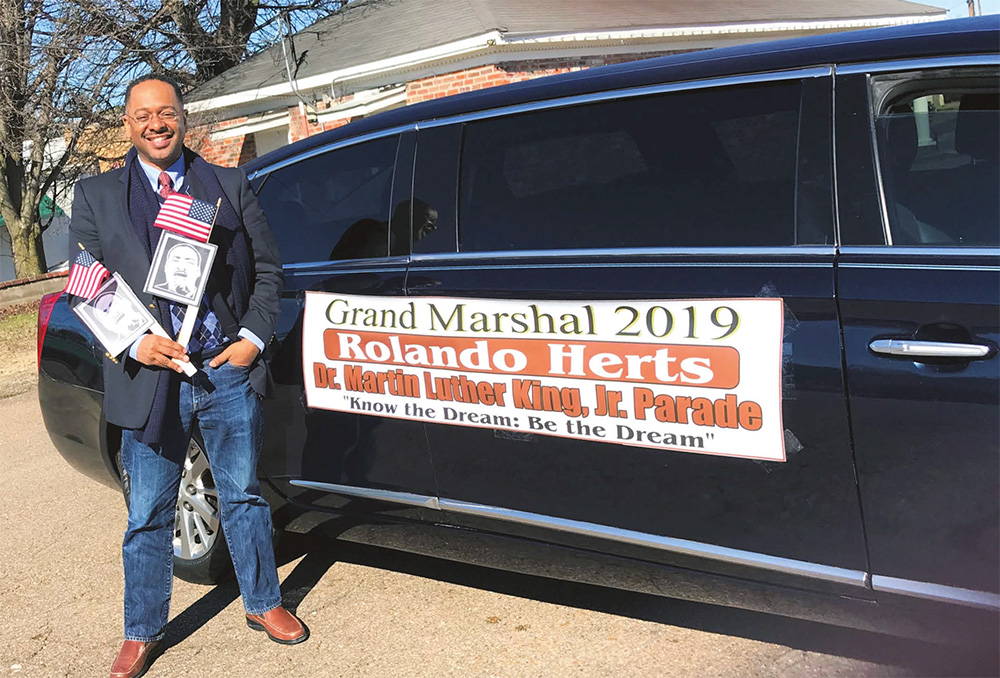
Sanford is candid. “There’s work we need to do. But the way to fix it is not by leaving; the way to fix it is by staying. If you care and want to get something done, you can pretty much get it done here.” Matty Bengloff shares that sentiment. He insists, “This is such fertile ground for entrepreneurial endeavors. And so many grants to help you get started.” In 2013, he and his fellow TFA corps member, now wife, Suzette Matthews, opened the Delta Dairy, a popular self-serve frozen treats shoppe in downtown Cleveland that has cultivated a special community of all ages and walks of life. “The Delta is such a cool, beautiful place. People are really kind and engaging.” When he first arrived, he knew nothing about it. “I was confused about why it was even called the Delta.” He fell in love with it quickly, though he admits growing up in Long Island made for quite an adjustment to living in Marianna, Arkansas, a town of 3500. What does one do in a town of 3500? Jenn Mohead remembers her own adjustment to small-town life. She laughs about wild and crazy Friday night plans of potluck dinners. “A potluck? What are we supposed to do at a potluck?” The answer? “Just visit.” There’s a joke in TFA, Matty shared, that if you get placed in the Delta, “you run a marathon, you get a dog, and then you get married.” Matty did all three. In that order. “It’s been a wonderful place to build community. It’s something special that couldn’t have happened other places.”
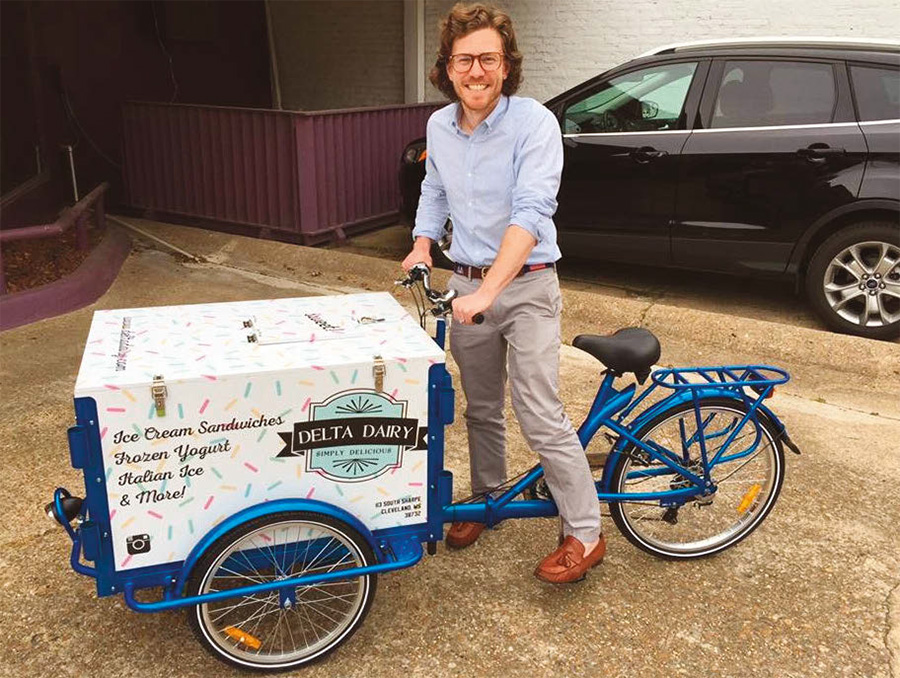
Mary Kate Hinshaw is also from Long Island and knew nothing about the Delta when she arrived in Clarksdale, where she taught for eight years at Kirkpatrick Elementary. “I’ve never felt as cared for as I did there. And Clarksdale felt like that. People were watching out for me.” Her love for her students and for teaching, the community, and the cultural assets kept her around, as did her fiancé, Clarksdale native, Billy McKee. “Too,” she admits, “I was sick of the cold and wanted to be someplace warm.”
Warm weather was certainly a draw for John Delperdang, who grew up in Minnesota where winters are most unkind to a tall, skinny frame like his. He also wanted to be someplace that needed teachers. TFA sent him to teach math and ACT preparation in Rosedale, which provided a vibrant community. “The teachers were really committed to their schools and the kids. And they were so willing to help me.” John discovered that he loved teaching. He also discovered that he loved the Delta. In 2016 he married his across-the-street neighbor and fellow corps member, Amanda, who is from Utah. They now have two children and live in Leland. Amanda, who is an artist and graphic designer, has been teaching art and reading. However, this will be her last year in the classroom because she is founding the Mississippi Delta Nature and Learning Center in Greenville, set to open in the fall of 2022. She is also a certified horticulturalist. “Our community needs family recreation spaces. And children need opportunities to play.”
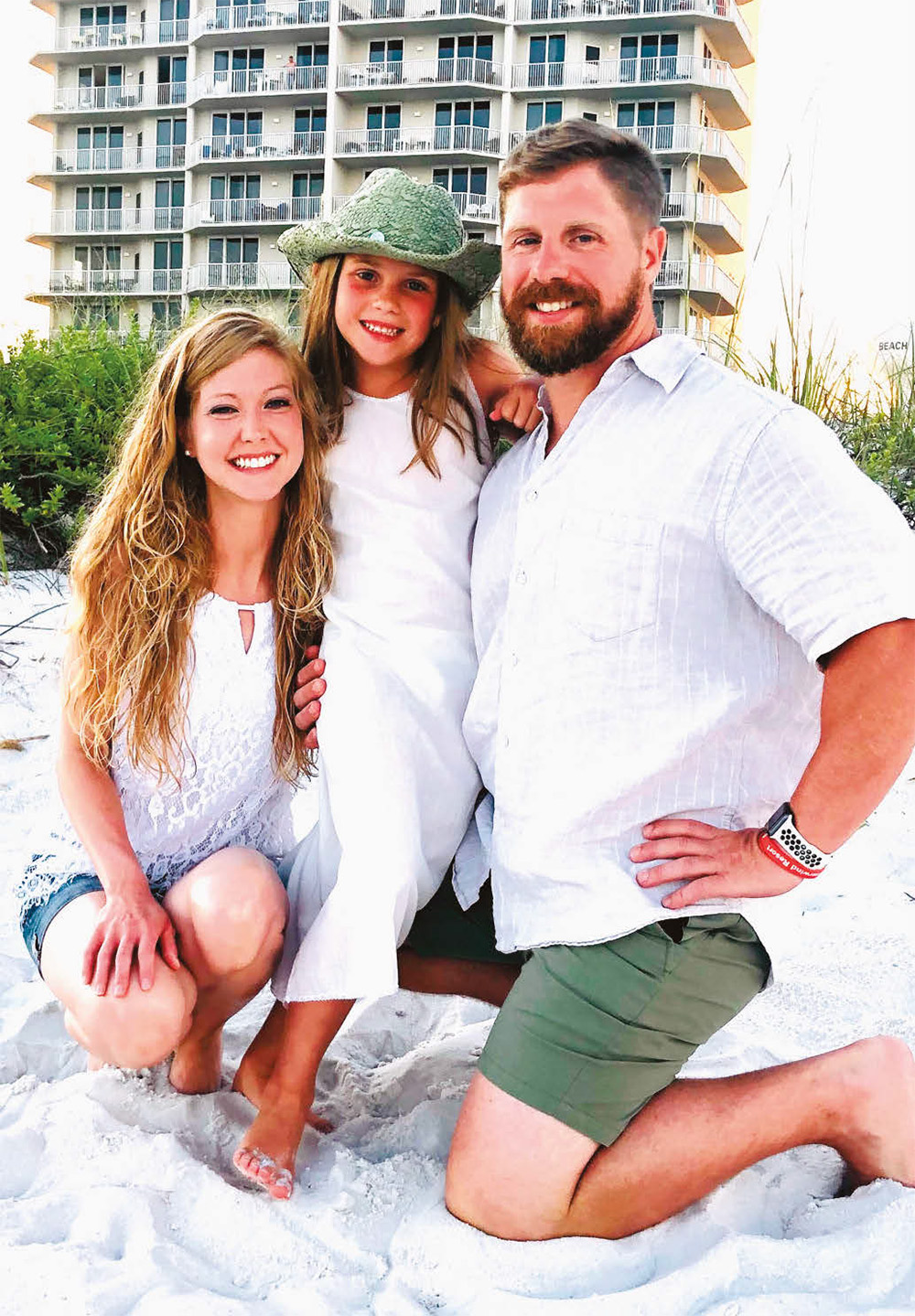
“We really enjoy our community,” John shares. “I’m part of the Rotary Club here, and we are doing good projects. We bought a house. This is where we are going to be.” They have even recruited others to join them; Amanda’s parents bought a house down the road, and her brother is also considering moving there. “We love the laid-back lifestyle, and the cost of living is so cheap,” she says. Colleen Zamm’s parents bought a house on Moon Lake, and she knows of many other TFAers whose parents have bought around the area. “It’s a place where people know their neighbors and take care of each other,” she explains.
Colleen and Justin actually tried to leave the Delta after completing their service and getting married in 2012 but found they simply could not stay away. “Our plans took us to Connecticut. But we were miserable,” Colleen says. “I thought, ‘Has Mississippi ruined us forever?’”
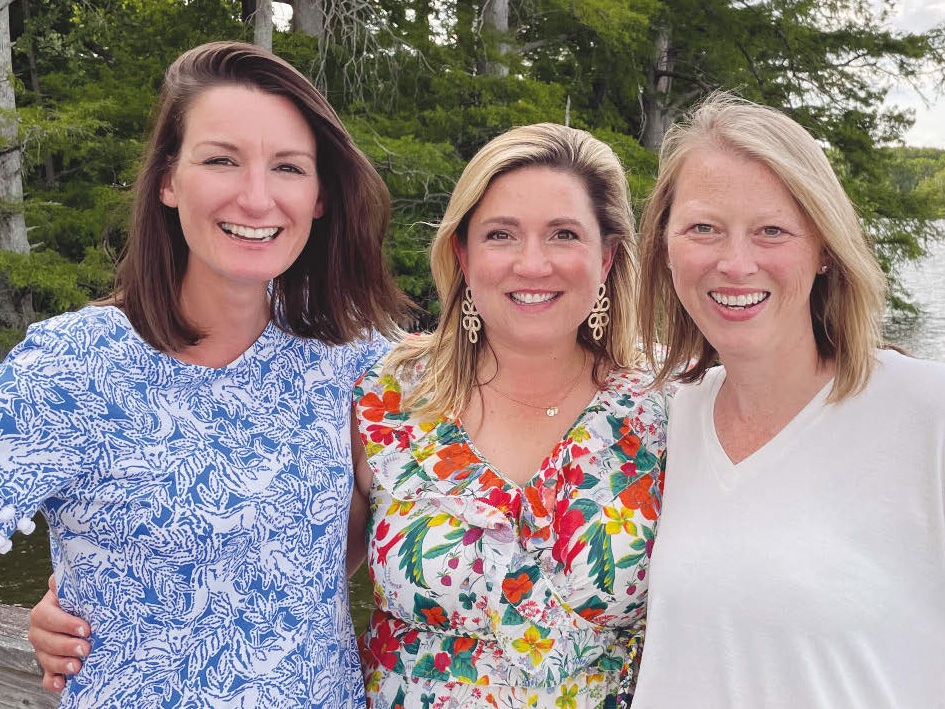
“Back in Connecticut we realized we could be anywhere because all the stores are the same and nobody was talking,” Justin explains. “We missed the characters.” By day, Justin, teaches music, and by night he plays gigs around town, often at Red’s Blues Club. “Every night at Red’s is like living in a Barry Hannah or Larry Brown story. It’s addictive.” But it’s more than just the characters that draws people, according to Justin. He believes it’s about connection.
“I know all my neighbors,” Colleen states. “All of my students. I see them at the grocery store. We see them grow up. We see them graduate from college. There are so many stories.” Jenn Mohead asserts it is connection that is partly responsible for those stories. “I have seen so many students’ trajectories change to a path of opportunity. That sense of connection in the community allows us to make educational equity a reality for students.”
“People are so hungry to connect,” Justin claims, “especially over the kinds of lines that are drawn in society.” He values the blues as a conduit for shared humanity, for connection. “People come here from all over the world because it is so rare to have this live music experience where people are the connection. We play in small venues, and the performers and the audience are right there together. The number of people who come up to me and say ‘this is the greatest night of my life’ blows my mind.”
